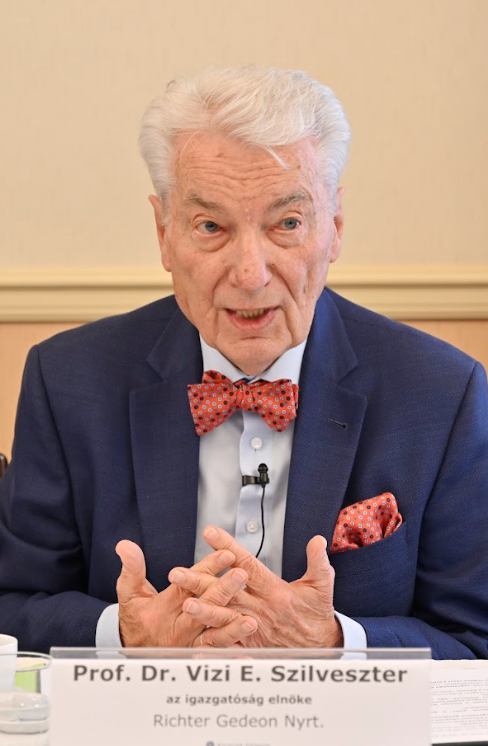A RICHTER-KOKI press conference. Background and vision
Richter Gedeon Plc. and KOKI have been working together successfully for decades, but on 5 April 2024 they held their first joint, and international, press conference.
Let's see the background!
A few weeks ago, it was reported in the news portals that Richter Gedeon Plc. has elected E. Szilveszter Vizi as Chairman of the Board of Directors from 1 March 2024. Let us take this opportunity, and congratulate him on his appointment!
Professor Vizi, Director of KOKI from 1989 to 2002 and President of the MTA from 2002 to 2008, has been a member of the Board of Directors of Richter Gedeon Plc. since 2008, in addition to his numerous scientific and public functions. He was also the initiator of the mutually beneficial relationship between Richter and KOKI, which has been strong for decades and has developed into a wide range of collaborative activities, from R&D contracts to Richter's thematic calls to joint research in consortia, in which several research groups of the institute have participated and continue to participate. We have also won a tender for PhD students from this pharmaceutical company and, most recently, joint research is being carried out in the framework of the Translational Neuroscience National Laboratory. Researchers from our institute also play a key role in the work of the Neuroinflammation Network recently established by Richter and the Neuropsychiatric Translational Network. The joint international press conference suggests that the list of joint Richter-KOKI successes and events could grow even further.
Zoltán Nusser and Beáta Sperlágh, directors of our institute, attended the event. The date of this press conference was April 5, 2024, the day before the opening of the largest European psychiatric conference of the year, EPA 2024 (European Congress of Psychiatry 2024), organized with the active participation and support of Richter.
This conference attracts thousands of people, and it is a good opportunity for visiting psychiatrists to recognize "that they are visiting one of the citadels of psychiatric research" and to learn "how important a role Hungarian researchers and research in this field have played and are playing worldwide." The quotes were taken from the introductory speech of Gábor Orbán, CEO of Richter, who with justifiable pride listed Richter's successes in terms of numbers and awards, including the fact that cariprazine has been in the TOP 100 pharmaceuticals in the world for several years, that it has won the Innovation Grand Prize 4 times, but first of all he mentioned that "the number of Richter researchers is almost 1200, which is the largest innovation base - not only in the pharmaceutical industry - but in the whole region."
So for Richter, R&D (research and development) is not an empty word. Even though "currently a successful original research project costs between 1.5 and 2.5 billion dollars", as Dr. István Greiner, Richter's R&D Director, told us, the company has molecules in the research phase that form the basis of Richter's ambitious vision for the future. "We currently have a promising molecule in phase 2 that would be applied to treat obesity by reducing appetite. In a joint project with AbbVie - the world's second-largest pharmaceutical company - we have a molecule currently in Phase 1. It is for the treatment of psychiatric diseases. Alongside this, we are confident of the success of our 3 other molecules in Phase 1 trials".
Dr. Kristóf Kóczián, Head of Richter's CNS (central nervous system) business, said of the near future, "Our goal is to have a successful new original molecule out of our small molecule drug discovery portfolio by the time the cariprazine patent expires." Among other things, he told us that "cariprazine has so far treated 1.3 million patients and has a real chance of becoming the largest-selling atypical antipsychotic ever in the history of medicine."
After the presentation by Professor E. Szilveszter Vizi, Chairman of the Board of Directors of Richter Gedeon Plc. His talk, although closely related to the previous topics, gave a different perspective on the importance of Richter's success. "A significant proportion of psychiatric illnesses are now clearly diseases of civilization. ... At the same time, it is precisely these drugs, which we have heard about here, that can help people with neurological disorders to at least maintain their ability to work and their equal place in society". He stressed that an important part of Richter's success is "the ability to incorporate the pharmacological knowledge that exists in the country into drug development" and that we need to use the intellectual capital that exists in our country, something Richter is at the forefront of in Hungary."
Prof Dr. Zoltán Nusser, Deputy Director of the Institute of Experimental Medicine (KOKI), who initiated the press briefing on behalf of KOKI, highlighted the benefits of the long-standing partnership between Richter and the Institute in achieving the Institute's main goals of supporting cutting-edge scientific research, training neurobiology postgraduates, and promoting the clinical and economic exploitation of results. "In the past 20 years, we have launched 95 joint projects supported by Richter Gedeon, and this number reflects the close and active nature of our collaboration. In addition, we are also collaborating on several joint larger projects, such as the Translational Neuroscience National Laboratory," he said.
Prof. Dr. Beáta Sperlágh, Director of KOKI, responded to a question after the press conference, which served as a closing statement of the successful event.
"Almost every family has a member who suffers from some form of psychiatric illness. Breakthroughs in treatment can only be hoped for if breakthroughs are made in discovery research, in understanding brain function, at the level of molecules and neuron networks. Scientific collaboration with Richter could lead to new ideas, solutions, and drug targets. "





